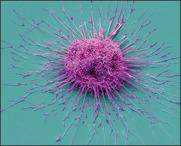当前位置:
X-MOL 学术
›
Lancet Oncol.
›
论文详情
Our official English website, www.x-mol.net, welcomes your
feedback! (Note: you will need to create a separate account there.)
Targeting MET in EGFR resistance in non-small-cell lung cancer-ready for daily practice?
The Lancet Oncology ( IF 41.6 ) Pub Date : 2020-02-03 , DOI: 10.1016/s1470-2045(19)30859-9 Sabine Schmid 1 , Martin Früh 2 , Solange Peters 3
The Lancet Oncology ( IF 41.6 ) Pub Date : 2020-02-03 , DOI: 10.1016/s1470-2045(19)30859-9 Sabine Schmid 1 , Martin Früh 2 , Solange Peters 3
Affiliation

|
The EGFR mutation was discovered as oncogenic driver in non-small-cell lung cancer (NSCLC) more than 15 years ago. Unfortunately, resistance universally develops on EGFR tyrosine kinase inhibitors (TKIs) after a median of 1–2 years on treatment. The mechanisms of resistance to first-generation (ie, gefitinib, erlotinib) and second-generation (ie, afatinib, dacomitinib) TKIs have been explored extensively and can be grouped into second-site EGFR mutations (mostly Thr790Met), activation of alternative signalling pathways (mostly MET amplification), and histological transformation.
中文翻译:

针对 MET 治疗非小细胞肺癌的 EGFR 耐药性准备好进行日常实践了吗?
15 多年前,EGFR 突变被发现是非小细胞肺癌 (NSCLC) 的致癌驱动因素。不幸的是,EGFR 酪氨酸激酶抑制剂 (TKI) 在中位治疗 1-2 年后普遍出现耐药性。对第一代(即吉非替尼、厄洛替尼)和第二代(即阿法替尼、达克替尼)TKI 的耐药机制已被广泛探索,可分为第二位点EGFR突变(主要是 Thr790Met)、替代信号通路的激活途径(主要是MET扩增)和组织学转化。
更新日期:2020-03-03
中文翻译:

针对 MET 治疗非小细胞肺癌的 EGFR 耐药性准备好进行日常实践了吗?
15 多年前,EGFR 突变被发现是非小细胞肺癌 (NSCLC) 的致癌驱动因素。不幸的是,EGFR 酪氨酸激酶抑制剂 (TKI) 在中位治疗 1-2 年后普遍出现耐药性。对第一代(即吉非替尼、厄洛替尼)和第二代(即阿法替尼、达克替尼)TKI 的耐药机制已被广泛探索,可分为第二位点EGFR突变(主要是 Thr790Met)、替代信号通路的激活途径(主要是MET扩增)和组织学转化。











































 京公网安备 11010802027423号
京公网安备 11010802027423号